Identification of consumption of medicinal plants and trendy supplements during pregnancy in a central Mexican hospital
DOI:
https://doi.org/10.14482/sun.41.01.320.968%20Keywords:
medicinal plants, phytotherapy, dietary supplements, pregnancyAbstract
Objective: To identify the use of herbal medicine and supplements among pregnant women.
Materials and methods: A descriptive observational study was conducted with a non-probabilistic sample of 60 pregnant women of all ages, from 4 to 38 weeks of gestation, who were under medical care at a general hospital and had signed an informed consent form. A data collection form was designed and administered to those who agreed to participate, and their responses were analyzed.
Results: Ninety percent of pregnant women are familiar with medicinal plants, and 100 % of them consume them. The most commonly used plants are lemon balm (20 %), chamomile (18 %), rue (13 %), orange blossom (8 %), and cinnamon (6 %); twenty percent consume these daily, while 51.7 % do so two to three times a week. Common reasons for use include staying slim, feeling relaxed, “helping the pregnancy,” and feeling better. Additionally, 16.7 % use trendy supplements. The literature reports adverse effects for many of the products mentioned, including liver toxicity, hormonal disturbances, bleeding, premature labor, miscarriage, allergic reactions, gastrointestinal irritation, and uterine contractions.
Conclusions: The group of pregnant women is knowledgeable about and consumes various medicinal plants and supplements. It is crucial to inform them about the potential risks associated with the use of these products and to encourage them to consult specialists before starting any therapy during pregnancy.
Downloads
Published
How to Cite
Issue
Section
License
(COPIE Y PEGUE EL SIGUIENTE TEXTO EN UN ARCHIVO TIPO WORD CON TODOS LOS DATOS Y FIRMAS DE LOS AUTORES, ANEXE AL PRESENTE ENVIO JUNTO CON LOS DEMAS DOCUMENTOS)
AUTORIZACIÓN PARA REPRODUCCIÓN, USO, PUBLICACIÓN Y DIVULGACIÓN DE UNA OBRA LITERARIA, ARTISTICA O CIENTIFICA
NOMBRE DE AUTOR y/o AUTORES de la obra y/o artículo, mayor de edad, vecino de la ciudad de , identificado con cédula de ciudadanía/ pasaporte No. , expedida en , en uso de sus facultades físicas y mentales, parte que en adelante se denominará el AUTOR, suscribe la siguiente autorización con el fin de que se realice la reproducción, uso , comunicación y publicación de una obra, en los siguientes términos:
1. Que, independientemente de las reglamentaciones legales existentes en razón a la vinculación de las partes de este contrato, y cualquier clase de presunción legal existente, las partes acuerdan que el AUTOR autoriza de manera pura y simple a La UNIVERSIDAD DEL NORTE , con el fin de que se utilice el material denominado en la Revista
2. Que dicha autorización se hace con carácter exclusivo y recaerá en especial sobre los derechos de reproducción de la obra, por cualquier medio conocido o por conocerse, comunicación pública de la obra, a cualquier titulo y aun por fuera del ámbito académico, distribución y comercialización de la obra, directamente o con terceras personas, con fines comerciales o netamente educativos, transformación de la obra, a través del cambio de soporte físico, digitalización, traducciones, adaptaciones o cualquier otra forma de generar obras derivadas. No obstante lo anterior, la enunciación de las autorizaciones es meramente enunciativa y no descartan nuevas formas de explotación económica y editorial no descritas en este contrato por parte del AUTOR del artículo, a modo individual.
3. Declara que el artículo es original y que es de su creación exclusiva, no existiendo impedimento de ninguna naturaleza para la autorización que está haciendo, respondiendo además por cualquier acción de reivindicación, plagio u otra clase de reclamación que al respecto pudiera sobrevenir.
4. Que dicha autorización se hace a título gratuito.
5. Los derechos morales de autor sobre el artículo corresponden exclusivamente al AUTOR y en tal virtud, la UNIVERIDAD se obliga a reconocerlos expresamente y a respetarlos de manera rigurosa.
EL AUTOR
















